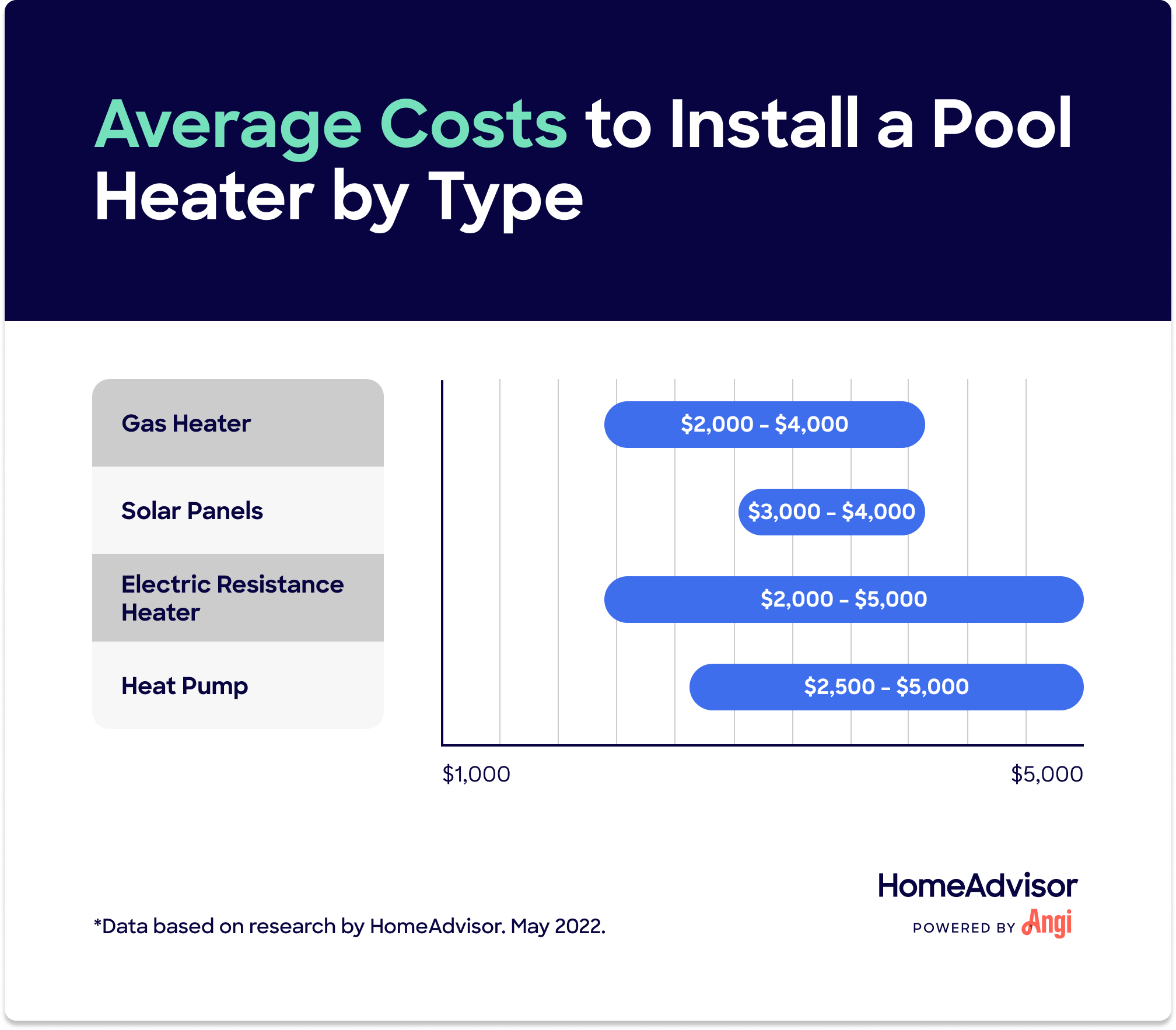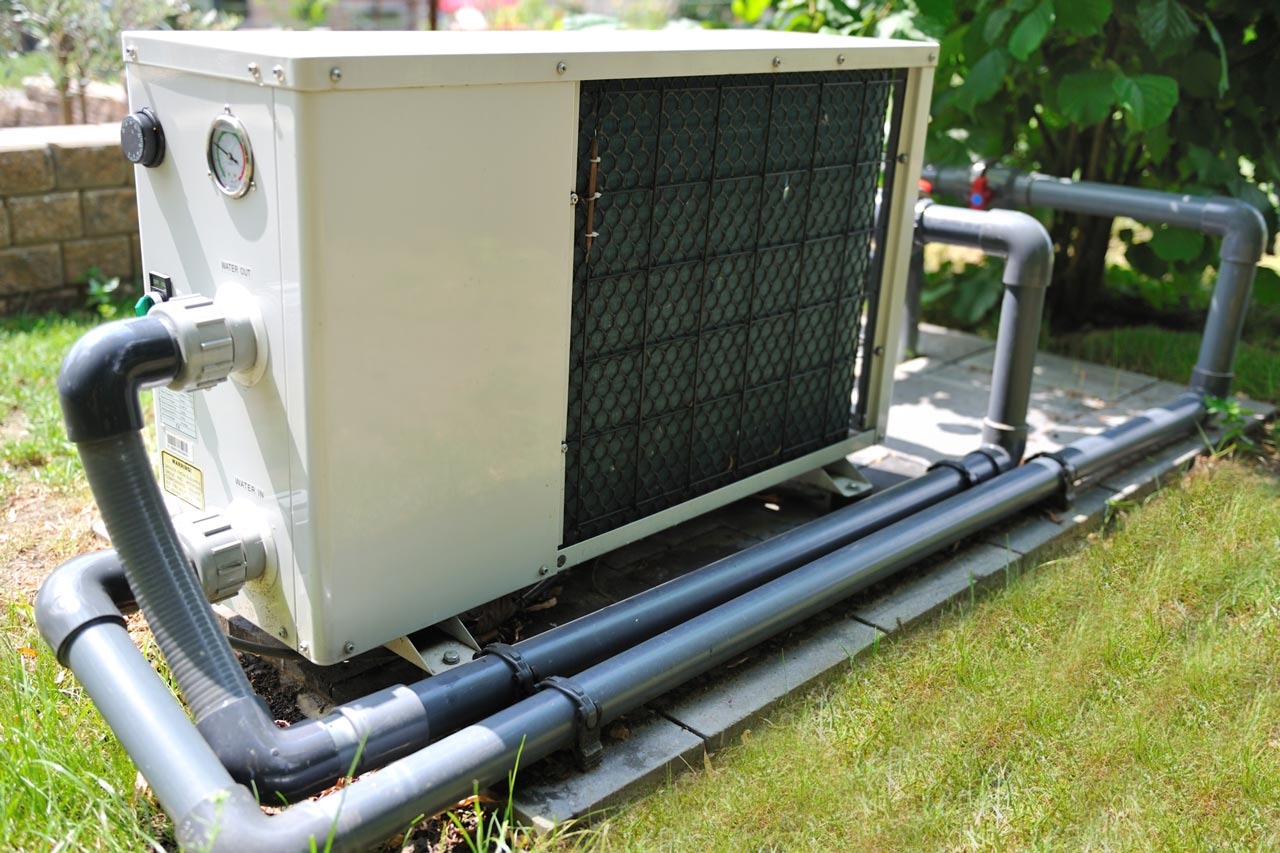How Much Does It Cost to Install a Pool Heater?
Typical Range:
$1,788 - $4,150
Typical Range:
$1,788 - $4,150
Cost data is based on actual project costs as reported by 942 HomeAdvisor members. Embed this data
.
.
.
.
.
.
.
.
.
.
.
.
.
.
.
.
.
.
.
.
.
.
.
.
.
.
.
.
.
.
•
•
•
•
Updated June 3, 2022
Written by HomeAdvisor.A pool heater costs around $2,959 on average. Depending on the type of heater, your climate, and the size of your pool, you should expect to pay anywhere from $1,788 and $4,150. Pool heaters are excellent for allowing you to take a swim even when it’s snowing out. You’ll also need to consider the cost to run a pool heater when installing one, which can run from $0 for a solar-powered option to upwards of $850 a month for propane.
Let's calculate cost data for you. Where are you located?
Where are you located?
| National Average | $2,959 |
| Typical Range | $1,788 - $4,150 |
| Low End - High End | $300 - $5,700 |
Cost data is based on actual project costs as reported by 942 HomeAdvisor members.
Installing a pool heater costs anywhere from $300 to $5,300 depending on the fuel source. The type of heater you choose can greatly influence your cost, both upfront and over time.
The size of your pool, whether or not you have an existing pool heater, as well as what type of utilities you have available to you will all impact the final cost of pool heater installation. Whether it’s electric or gas, you’re likely going to need to run lines if this is your first time installing a pool heater.
Not every city will have the same utilities available to them. So whereas one area of the United States will have gas hookups readily available, other areas may only have electric. You’ll likely need to make a decision based on location factors.
You should also take into account your climate. The more sun your area receives, the more likely you are to have the option for solar-powered pool heaters. You’re also likely to use less energy to heat the pool, as the temperature outside will handle that job the majority of the year.
Removing the old pool heater will cost around $25 to $50, depending on whether or not there are any issues with removal. You may also find specials where professionals will waive the fee of removal and disposal.
If you’re laying pipes or wiring, you’re likely going to need to pull permits. Though this does come down to your local municipality. Permits for pool heaters can range from $50 to $500, depending on where you live and the type of hookup you’re looking to install.
It’ll vary somewhat by climate, but you’ll need about 50,000 BTUs for every 5,000 to 10,000 gallons of water. Double that number for colder climates or those using their pool in the winter. You can also get away with a smaller heater if you’re okay with a longer time to heat it up or plan on using a cover or solar blanket.
| Volume (gallons) | Pool Surface Area (square feet) | Heather Size (BTUs) |
|---|---|---|
| 1,000 - 10,000 | ≤ 300 square feet | 100,000 - 200,000 |
| 10,001 - 20,000 | 301 - 500 | 200,001 - 300,000 |
| 20,001 - 40,000 | 501 - 800 | 300,001 - 400,000 |
| 40,001 - 80,000 | 801 - 1,200 | 400,000+ |
The cost of installing utility lines will fall between $350 to $2,100, depending on the type of utility you’re looking to hook up. You’re also going to need to install water pipes to the heater itself, so you’re working with at least one type of pipe.
Cost to install gas lines: $350–$800
Cost to install electrical circuits: $500–$2,100
Cost to install water lines: $350–$1,900
You have four main types of pool heaters you can choose from:
Propane/gas pool heaters
Solar pool heaters
Heat pumps
Electric resistance heaters
You’ll want to pick the pool heater best suited for your climate and energy source. Also, consider if you want to pay fewer upfront costs for the pool heater unit and more in the long run for monthly usage or vice versa.
Propane or gas pool heaters cost between $2,000 to $4,000 for installation. This includes the cost of materials and the labor associated with installing one. You can save significantly on labor costs if you have an existing gas line running to your home. If not, you’ll need to opt for a propane tank or look into the feasibility of hooking up to gas.
While gas and propane pool heaters have a lower upfront cost, they do tend to have a higher monthly cost, ranging from $200 to $850 to run. If you live in climates where it’s relatively cold year-round, you may spend more on running the heater in just a couple of years. However, gas and propane pool heaters work quickly to heat a pool and have great temperature control.
Solar pool heaters cost between $3,000 to $4,000 with installation and materials accounted for. While these pool heaters tend to have a larger upfront cost associated with them, their monthly costs are significantly less, coming in at around $0 to $10 every month. They are completely reliant on sunlight, however, only making them ideal in sunnier states such as Arizona, California, Florida, and Texas.
Ideally, you may want to add solar panels to cut down on gas or electric heater operating costs. When there’s a bright yet chilly day, you can still harness solar power to keep your pool nice and warm. Solar pool heaters don’t normally have the ability to set a temperature and tend to simply keep the pool at a pleasant temperature passively instead.
Pool heat pumps cost around $2,000 to $5,000 on average. Unlike gas or electric heaters, which generate heat for the water, heat pumps utilize the air around them to heat the water. Heat pumps for pools will cost between $120 to $200 per month to run, making them more efficient than propane or electric options. They do, however, come with a greater upfront cost.
Because heat pumps rely on air, they aren’t the most ideal option to heat a pool, despite their efficiency. Pool heat pumps rely on the air to heat up the water, so if it’s really cold out, it’s going to take much longer to get the air back up to a reasonable temperature. This significantly cuts down on the time to heat a pool.
Electric resistance heaters will cost around $2,000 to $5,000 when you take into account labor and materials. Not only do electric resistance heaters require a larger upfront cost, but they also don’t tend to have the best efficiency. The cost to run an electric resistance pool heater is anywhere from $175 to $600 per month.
Ideally, you’d only want an electric resistance pool heater if it rarely falls below 55 degrees Fahrenheit in your area. Anything lower than that and your electric resistance pool heater will have a tough time trying to keep your pool warm.
The cost of installing a pool heater yourself will fall between $1,500 and $4,000 for the pool heating unit itself. You’ll effectively save around $300 to $1,000 in labor costs through this method. This only really applies if you had an existing pool heater in place.
If you need new installation of gas lines, water lines, or electric wiring to the pool heater, let a pool heater installer near you handle this operation. Mixing electricity or gas with water is already dangerous enough even when you’re a professional, so eliminate as many potential hazards as possible and let the pros handle installation.
A pool costs between $18,000 to $46,500 to install. However, considering location is important. Only having the option to use the pool during certain months of the year makes it feel as if you won’t receive your personal ROI and usage of the pool.
Every year and even every month will vary in costs of running your pool heater. Utility costs will vary from state to state as well. So, even if you had the same exact temperature conditions in two different states, you might come out with different monthly costs.
| Type of Heater | Cost to Run per Month | Cost to Run per Year |
|---|---|---|
| Propane | $200 – $850 | $2,400 – $10,200 |
| Gas | $200 – $400 | $2,400 – $4,800 |
| Electric Resistance | $175 – $600 | $2,100 – $7,200 |
| Heat Pump | $120 – $200 | $1,450 – $2,400 |
| Solar | $0 - $10 | $0 - $120 |
One of the best ways to save money on pool heater operating costs is to purchase a pool cover. A pool cover costs around $650 to $2,350 to install. Installing a pool cover will reduce heating costs anywhere from 50% to 90%. They also have no operating costs.
Solar blankets are another type of pool cover used to help pools retain heat. The cost of a solar blanket will fall between $50 to $500.
You could also opt to build a pool enclosure. The cost of building a pool enclosure will fall between $5,300 and $15,600 on average. While the pool is still technically outside in a non-climate controlled area, putting the pool in a glass enclosure will help the inside maintain heat similar to a greenhouse.
Yes, you can add a pool heater to an existing pool, so long as your yard has the space for a heater. Most pools are built without heaters, so it’s not uncommon for companies to receive requests from homeowners looking to install pool heaters onto existing pools.
No, a pool heater does not need to run all the time. A pool heater requires between 24 to 72 hours to fully heat a pool, so you should prepare and run it before you get in and shut it off if you don’t plan to use it afterward. Opt for a pool cover after you’ve heated the pool to allow the water to maintain its temperature for longer.
Yes, a pool heater can freeze and cause damage to internal components. Constantly cycling water, sealing your pool in the winter (winterizing your pool), and regular maintenance servicing should help prevent freezing of a pool heater.
A pool heater will last between 6 to 12 years on average, so long as it’s properly maintained. Regularly service the pool heater and have any repairs addressed as soon as possible to prevent a complete replacement.

